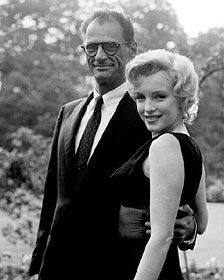The Author: Arthur Miller
Arthur Miller was an American playwright who was born in 1915 on October 17. He grew up in New York to a Jewish family. He graduated from the University of Michigan in 1938 where he began to distinguish himself as a playwright. His first plays were Honors at Dawn (1936) and No Villain (1937) which won the University of Michigan Hopwood Awards. He was a prominent figure in American Theatre and cinema for over 61 years, writing a wide variety of dramas, including celebrated plays such as The Crucible, A View From the Bridge, All My Sons, and Death of a Salesman, which are studied and performed worldwide. Miller was often in the public eye, most famously for refusing to give evidence against others to the House Un-American Activities Committee, being the recipient of the Pulitzer Prize for Drama among countless other awards, and for his marriage to Marilyn Monroe. Miller's career as a writer spanned over seven decades, and at the time of his death in 2005, Miller was considered to be one of the greatest dramatists of the twentieth century. After his death, many respected actors, directors, and producers paid tribute to Miller, some calling him the last great practitioner of the American stage.
Puritan Belief of Witchcraft
Puritans believed in witshes and their ability to harm others. They defined witchcraft as entering into a compact with the devil in exchange for certain powers to do evil. Witchcraft was considered a sin and a crime because it denied God superiority and the witch could supposedly make the Devil appear in different shapes. When the Devil appear in different shapes it would commit cruel acts against others. Therefore, under the puritan beliefs, it was important the accused individual was investigated. If they were found to be guilty, they were punished by death.

The real events of Salem Witch Trails
The Salem witch trials were a series of hearings before local magistrates followed by county court trials to prosecute people accused of witchcraft in Essex, Suffolk, and Middlesex Counties of colonial Massachusetts, between February 1692 and May 1693 . Over 150 people were arrested and imprisoned, with even more accused who were not formally pursued by the authorities. The two courts convicted twenty-nine people of the capital felony of witchcraft. Nineteen of the accused, fourteen women and five men, were hanged. One man,Giles Cory, who refused to enter a plea was crushed to death under heavy stones in an attempt to force him to do so. At least five more of the accused died in prison.
Despite being generally known as the "Salem" witch trials, the preliminary hearings in 1692 were conducted in a variety of towns across the province, Salem Village, Ipswich, Andover, as well as Salem Town, Massachusetts. The best-known trials were conducted by the Court of Oyer and Terminer in 1692 in Salem Town. All twenty-six who went to trial before this court were convicted. The four sessions of the Superior Court of Judicature in 1693, held in Salem Town, but also in Ipswich, Boston, and Charlestown, produced only three convictions in the thirty-one witchcraft trials it conducted.









